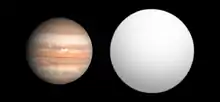WASP-14b
WASP-14b is an extrasolar planet discovered in 2008 by SuperWASP using the transit method. Follow-up radial velocity measurements showed that the mass of WASP-14b is almost eight times larger than that of Jupiter. The radius found by the transit observations show that it has a radius 25% larger than Jupiter. This makes WASP-14b one of the densest exoplanets known.[1] Its radius best fits the model of Jonathan Fortney.[2]
 Size comparison of WASP-14b with Jupiter. | |
| Discovery | |
|---|---|
| Discovered by | Cameron et al. (SuperWASP) |
| Discovery site | SAAO |
| Discovery date | April 1, 2008 |
| Transit | |
| Orbital characteristics | |
| 0.037+0.001 −0.002 AU | |
| Eccentricity | 0.095+0.004 −0.007 |
| 2.243756+5E-6 −1E-6 d | |
| Inclination | 84.79+0.52 −0.67 |
| 254.9+0.92 −1.72 | |
| Star | WASP-14 |
| Physical characteristics | |
Mean radius | 1.259+0.08 −0.058 RJ |
| Mass | 7.725+0.43 −0.67 MJ |
Mean density | 5,133 kg/m3 (8,652 lb/cu yd) |
| 126.2 m/s2 (414 ft/s2) 12.87 g | |
| Temperature | 2800 |
Orbit
First calculation of WASP-14b's Rossiter–McLaughlin effect and so spin-orbit angle was −14 ± 17 degrees.[3] It is too eccentric for its age and so is possibly pulled into its orbit by another planet.[1] The study in 2012 has updated spin-orbit angle to 33.1±7.4°.[4]
References
- Joshi, Y. C.; et al. (2008). "WASP-14b: A 7.7 Mjup transiting exoplanet in an eccentric orbit". Monthly Notices of the Royal Astronomical Society. 392 (4): 1532–1538. arXiv:0806.1478. Bibcode:2009MNRAS.392.1532J. doi:10.1111/j.1365-2966.2008.14178.x.
- Fortney; Marley, M. S.; Barnes, J. W. (2007). "Planetary Radii across Five Orders of Magnitude in Mass and Stellar Insolation: Application to Transits". The Astrophysical Journal. 659 (2): 1661–1672. arXiv:astro-ph/0612671. Bibcode:2007ApJ...659.1661F. doi:10.1086/512120.
- Winn, Joshua N. (2008). "Measuring accurate transit parameters". Proceedings of the International Astronomical Union. 4: 99. arXiv:0807.4929v2. Bibcode:2009IAUS..253...99W. doi:10.1017/S174392130802629X.
- Obliquities of Hot Jupiter host stars: Evidence for tidal interactions and primordial misalignments, 2012, arXiv:1206.6105
This article is issued from Wikipedia. The text is licensed under Creative Commons - Attribution - Sharealike. Additional terms may apply for the media files.
